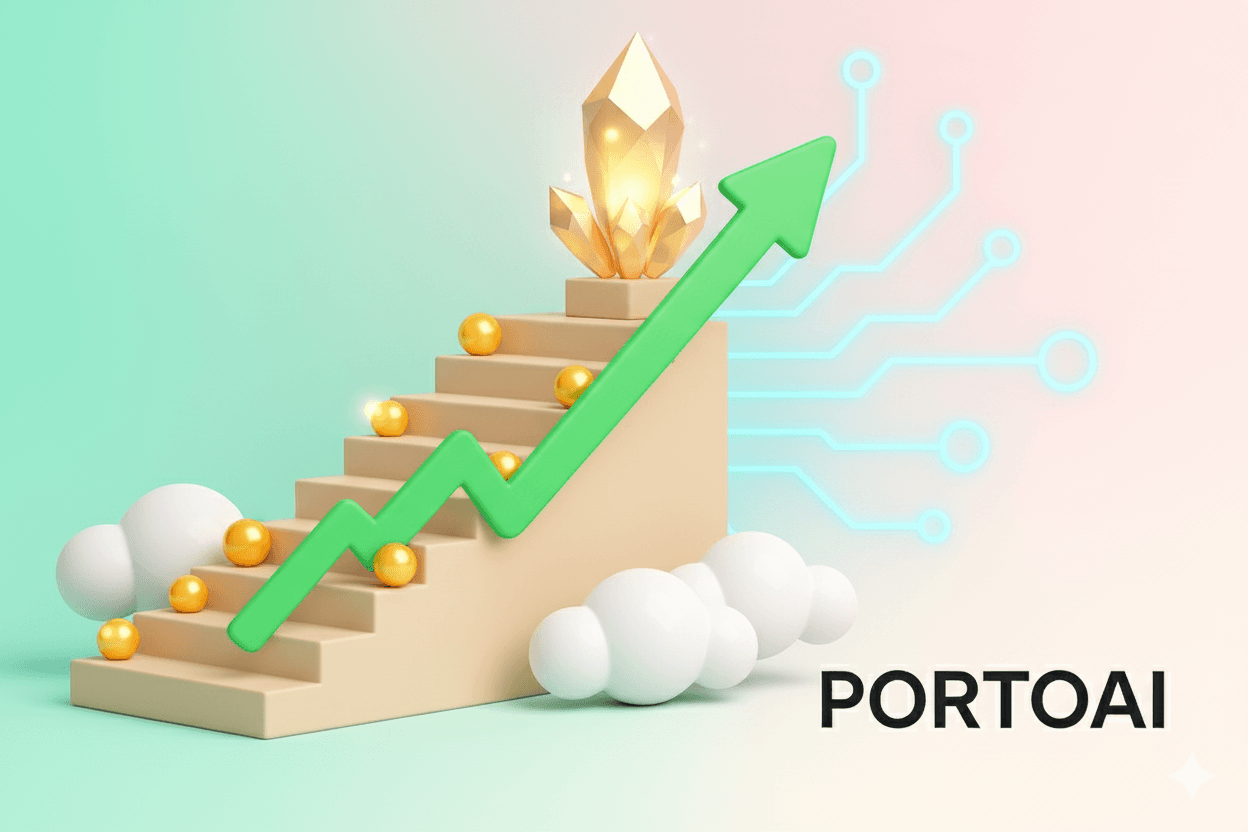Portfolio Losses? Expert Strategies to Navigate Market Downturns

Venkateshwar Jambula
Lead Market Researcher
11 min read
•Published on September 16, 2024
•Portfolio Losses? Expert Strategies to Navigate Market Downturns
Navigating the complexities of financial markets inherently involves periods of volatility. While the pursuit of long-term growth is paramount, encountering portfolio losses can be a disquieting experience for even the most seasoned investors. At PortoAI, we understand that disciplined, data-driven decision-making is crucial during such times. This guide outlines how to approach market downturns with a strategic, informed perspective, leveraging insights to safeguard and recover your investments.
Understanding the Roots of Portfolio Decline
Before implementing recovery strategies, it's essential to diagnose the underlying causes of your portfolio's underperformance. Understanding these factors is the first step toward formulating an effective plan.
Common Causes of Portfolio Losses:
- Suboptimal Asset Allocation: Investing in assets that do not align with your financial goals or risk tolerance can lead to significant losses, especially if aggressive strategies are employed for conservative objectives.
- Unfavorable Market Conditions: Broad market downturns, often driven by macroeconomic trends, interest rate shifts, or geopolitical events, can impact even well-selected individual assets.
- Insufficient Diversification: Over-concentration in a single asset class or sector exposes your portfolio to heightened risk. When that specific area declines, the entire portfolio suffers disproportionately.
- Excessive Speculative Investments: Allocating a significant portion of your portfolio to high-volatility assets, such as penny stocks or complex derivatives, can amplify losses during periods of market stress.
- Lack of Conservative Holdings: An imbalance skewed heavily towards growth assets without sufficient allocation to more stable instruments like bonds can limit the portfolio's resilience during downturns.
- Poor Investment Decisions & Timing: Entry points at market peaks or the selection of fundamentally weak assets can preordain poor performance, requiring extended recovery periods.
Strategic Approaches to Portfolio Recovery
When faced with portfolio losses, a calm, analytical approach is vital. Panic-driven decisions often exacerbate the situation. Instead, focus on informed actions.
Key Steps for Recovery:
- Remain Composed and Analytical: Resist the urge to make impulsive decisions. Take a step back to assess the situation objectively. Your current portfolio value does not equate to a permanent loss unless you realize it through hasty selling.
- Revisit Your Investment Thesis: Evaluate the original rationale behind each investment. Were the fundamental principles sound? Understanding why an investment was made helps in determining whether the initial thesis remains valid or requires revision.
- Enhance Diversification: Review your asset allocation. If your portfolio is under-diversified, consider expanding into different asset classes or sectors that exhibit low correlation with your existing holdings. The PortoAI platform's Market Lens can help identify diversification opportunities across various asset classes.
- Assess Risk Tolerance: Ensure your current asset allocation accurately reflects your comfort level with risk. This assessment should be dynamic, adapting to your life circumstances and market outlook. PortoAI's risk console provides tools to quantify and manage portfolio risk.
- Rebalance Strategically: If certain asset classes have become over-represented due to market movements, rebalancing—selling some of the outperforming assets and buying more of the underperforming ones—can restore your target allocation and potentially capture future upside.
Navigating Market Corrections with PortoAI
Market corrections are a natural, albeit challenging, aspect of investing. They represent short-term price declines driven by shifts in investor sentiment or economic outlooks. While unsettling, corrections offer opportunities for disciplined investors.
Proactive Strategies for Resilience:
- Regular Portfolio Review: Continuously monitor your portfolio's composition. Ensure it aligns with your long-term objectives and risk parameters. Utilize PortoAI's goal planner to track progress and make necessary adjustments.
- Focus on Quality: Prioritize investments in companies with strong balance sheets, sustainable business models, and robust competitive advantages. Avoid companies with excessive debt that are vulnerable during economic downturns.
- Understand Your Holdings: Before making any decisions, possess a clear understanding of each asset's fundamentals, its role in your portfolio, and its current valuation.
- Factor in Costs: Be mindful of transaction costs and fees associated with buying or selling assets, as these can erode potential recovery gains.
- Long-Term Investment Horizon: Emphasize a long-term perspective. Market fluctuations are often short-lived in the grand scheme of compounding growth. Avoid attempting to time the market, which is notoriously difficult and often counterproductive.
- Invest in Resilient Sectors: Consider sectors like technology and infrastructure, which often demonstrate greater resilience and can even thrive during periods of economic uncertainty due to their essential nature and potential for innovation.
- Leverage Diversified Instruments: Utilize low-cost index funds and Exchange Traded Funds (ETFs) to gain broad market exposure and inherent diversification, reducing idiosyncratic risk.
- Consider Fixed Income: Bonds can serve as a stabilizing element in a portfolio, often preserving capital better than equities during periods of market stress.
Conclusion: Building a Resilient Investment Strategy
Experiencing portfolio losses is an inherent part of the investment journey. The critical differentiator lies in how one responds. By adopting a data-driven, disciplined approach, and leveraging advanced tools like PortoAI, investors can navigate market volatility effectively. Remember that consistent adherence to a well-defined strategy, coupled with a long-term outlook, is the most reliable path to achieving your financial objectives. PortoAI empowers you to make these informed decisions with confidence, transforming market challenges into opportunities for strategic growth.
Blog
Investment Insights and Tips
Explore our latest investment strategies and insights.

Stocks
Master Investment Psychology: Control Emotions for Smarter Stock Decisions
The Psychology of Stock Investment: Understanding Emotions That Affect Investment Decisions A stock market is a funny place – both the seller and buye...
Venkateshwar Jambula
November 7, 2024
•4 min read

Stocks
Power Grid India Stock: Analyzing PGCIL's Price Movements & Future
The Rise and Fall: Unraveling the Power Grid Corporation of India Stock Price The Power Grid Corporation of India Stock Price (PGCIL) has experienced ...
Venkateshwar Jambula
November 6, 2024
•10 min read

Stocks
Are Multibagger Stocks Still Possible in 2025? Your AI Guide
These 6 Multibagger Stocks Exploded in 2025 — Is Your Portfolio Still in 2022? Till June 2025, the benchmark Sensex has risen by around 4%, reflecting...
Venkateshwar Jambula
November 5, 2024
•11 min read

Stocks
Top 5 Indian Growth Stocks & Sectors for 2025: AI-Driven Insights
Top 5 Best Growth Stocks in India & Sectors to Watch in 2025 You see the market correction in late 2024 and early 2025 was driven by weak economic...
Venkateshwar Jambula
November 4, 2024
•9 min read